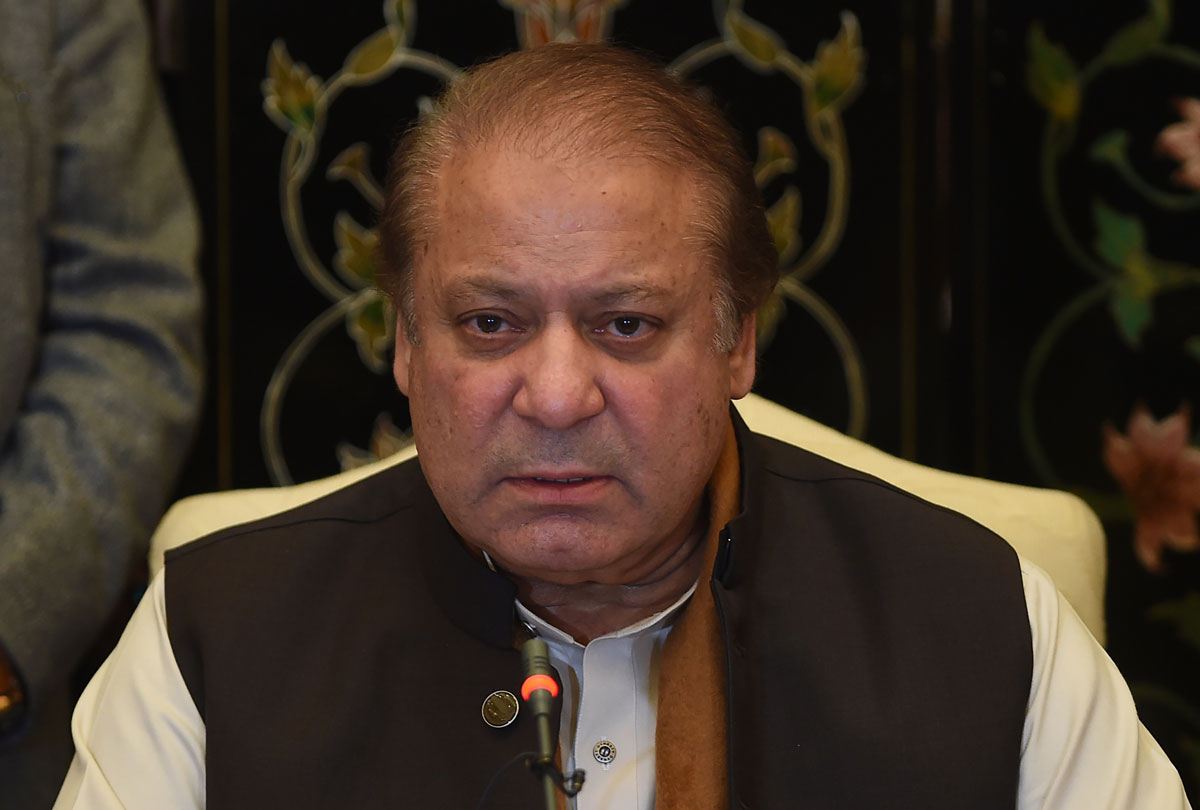Sharif Barred from Contesting Elections for Life
Former Pakistani Prime Minister Nawaz Sharif addresses a press conference in Islamabad, Pakistan, Jan. 3. (Farooq Naeem/AFP/Getty Images)
Pakistan’s deposed prime minister Nawaz Sharif became ineligible to hold public office for life, April 13, after the Supreme Court unanimously ruled that the disqualification of two lawmakers, including him was permanent, in a landmark verdict ending the political future of the three-time premier ahead of general elections this year, writes Sajjad Hussain.
The verdict was issued by the apex court while hearing a case related to the determination of time duration for disqualification of a lawmaker under the Constitution.
The five-judge bench of the Supreme Court had grappled with Article 62(1)(f) which only stated that a lawmaker is disqualified under specified conditions but did not set out the duration of the disqualification.
Article 62, which sets the precondition for a member of parliament to be “sadiq and ameen” (honest and righteous), is the same provision under which Sharif was disqualified on July 28, last year, in the Panama Papers case.
Sharif, 68, was disqualified by the Supreme Court for not being “honest and righteous” as he failed to declare in 2013 a salary he got from the company of his son in the UAE.
In February, the apex court also disqualified Sharif as the head of the ruling Pakistan Muslim League-Nawaz (PML-N).
In today’s verdict, the apex court said that under the country’s Constitution, no person once disqualified from office by the top court can hold public office again.
The historic ruling ended Sharif’s hopes to stage a political comeback in general elections slated after June.
Likewise, Pakistan Tehreek-i-Insaf (PTI) leader Jahangir Tareen was disqualified, Dec. 15, last year, by a separate bench of the apex court under the same provision.
Following the verdict, both Sharif and Tareen have become ineligible to ever hold public office.
The verdict read out by Justice Umar Ata Bandial said the disqualification of any member of parliament or a public servant under Article 62 (1)(f) in the future will be permanent. Such a person cannot contest elections or become a member of parliament.
Chief Justice Saqib Nisar, who was heading the five-judge bench, remarked before the verdict was announced that the public deserves “leaders of good character.”
The bench on February 14 had reserved the judgement on 17 appeals and petitions challenging the length of disqualification under the Article 62.
Sharif in January had stated through a written statement before the bench that disqualification under Article 62 is confined only to the election in question, and it is not perpetual.
The court had clubbed 17 petitions together to determine the duration of disqualification of lawmakers.
Reacting sharply to the ruling, PML-N leader and State Minister for Information Marriyum Aurangzeb dismissed it as a “joke” that many former premiers also faced.
“This joke has already been played on previous premiers and all 17 prime ministers of Pakistan have faced a similar fate,” she said.
“This decision is similar to the Supreme Court rulings which took former prime minister Zulfikar Ali Bhutto to the gallows and led to the assassination of Benazir Bhutto,” the information minister told reporters.
She said the decision is the result of a conspiracy by ‘Ali Baba and the Forty Thieves.’
Marriyum said that time and again, democratically elected leaders of Pakistan are unceremoniously removed from their post.
She said, “Decisions against Sharif are made first and trials are conducted later.”
“The verdict has started a phase of Sharif’s politics which our enemies should be afraid of,” she added.
She said Sharif is life-long leader of PML-N and “as long as he lives in the hearts of the people, this disqualification will hold no meaning.
Pakistan Peoples Party chairman Bilawal Bhutto-Zardari chairman in a tweet said that PML-N and PTI “forced the judicialization of politics.”
“I am of the belief that the people of Pakistan should make such decisions about the fate of politicians. Unfortunately, it is PTI & PMLN themselves who have forced the judicialization of our politics. Na-ehal Nawaz & Tareen must now face the consequences of their actions.”
Sharif, known as the Lion of Punjab, became the prime minister in the politically unstable Pakistan for a record three times, but every-time he was forced to quit in the middle of his term.
A steel tycoon-cum-politician, Sharif had served as the Prime Minister for the first time from 1990 to 1993.
Sharif’s second term as Prime Minister from 1997 ended in 1999 when then powerful Army chief General Pervez Musharraf staged a bloodless coup.
Both of Sharif’s first two stints had ended in the third year of his tenure.
In the 2013 general elections, Sharif’s party had emerged as the single largest party falling just short of a majority. But, he was able to muster the required strength within days as many independents came forward to support him.
Analysts said the apex court’s latest verdict has shut the last window of opportunity for Sharif and his lifelong disqualification may impact the performance of PML-N party in upcoming elections to be held after June.


